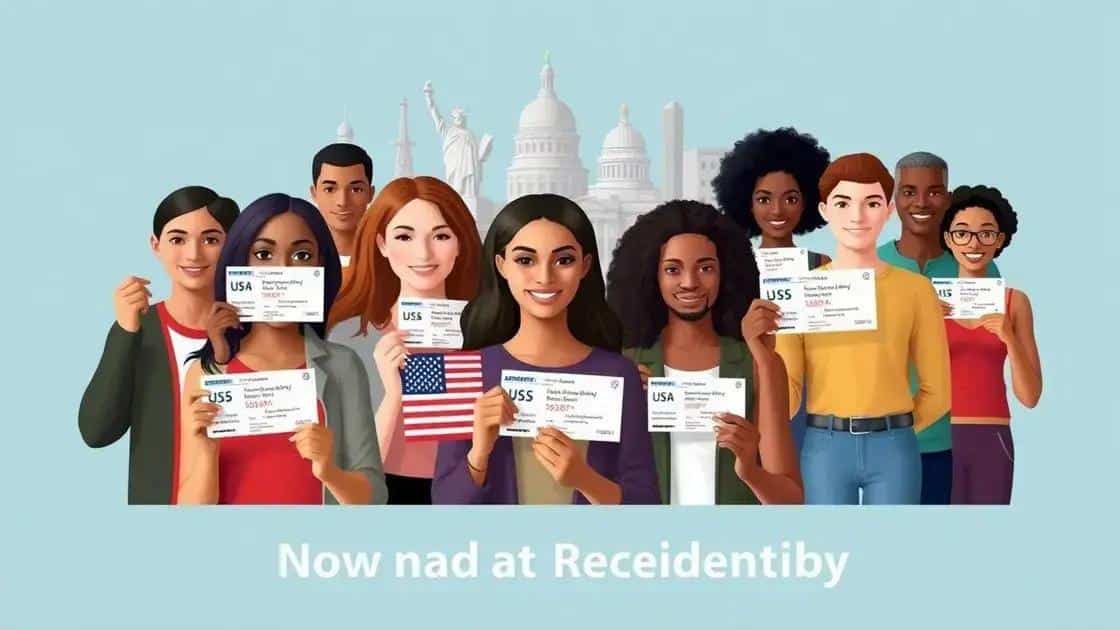Basics explained: Residency Card USA & Permanent Visa

Understanding the basics of residency cards and permanent visas in the USA is crucial for prospective immigrants, as these legal documents facilitate long-term residency, while financial strategies like gold investments can enhance application strength.
Basics explained about the residency card USA & permanent visa are crucial for anyone considering moving to the United States. With changing policies, it’s essential to understand your options and the benefits involved. Ready to dive in?
Understanding the residency card in the USA
Understanding the residency card in the USA is vital for those looking to live and work in the country. This card grants individuals legal residence and offers various benefits. If you’re wondering what it takes to obtain one, keep reading!
What is a Residency Card?
A residency card, also known as a green card, allows foreign nationals to reside permanently in the USA. There are several pathways to obtaining this card that cater to different applicants.
Types of Residency Cards
Different options exist for obtaining a residency card. Here are the primary ways:
- Family Sponsorship: U.S. citizens can sponsor family members.
- Employment-Based: Employers can sponsor foreign workers.
- Asylum or Refugee Status: Individuals escaping persecution may apply.
- Investment: Significant investment in U.S. businesses can lead to residency.
The process can vary based on the category you apply under. It’s important to gather proper documents and meet eligibility criteria. When applying, remember that the residency card allows you to live, work, and travel freely within the USA.
Moreover, having a residency card can open doors to various opportunities and benefits. For example, it enables you to apply for a driver’s license, enroll in schools, and even apply for citizenship after meeting certain conditions.
In summary, knowing how the residency card functions will help ease the application process. Research each category thoroughly to find the best path for you.
Permanent visa options and their advantages

Permanent visa options are essential for individuals aiming to build their lives in the USA. These visas offer various benefits that can enrich the lives of holders. Understanding the available options is the first step toward a smooth transition.
Types of Permanent Visas
There are several types of permanent visas you can explore, each designed for different situations. Here are some key categories:
- Family-Based Visa: For relatives of U.S. citizens or green card holders.
- Employment-Based Visa: For individuals with job offers from U.S. employers.
- Investor Visa: For those who invest a significant amount in a U.S. business.
- Special Immigrant Visa: For specific groups including veterans and certain religious workers.
Each type of visa comes with distinct requirements. Family-based visas typically require a sponsor, while employment-based ones require job offers or skills. Understanding these details will help you navigate the application process more effectively.
Additionally, holding a permanent visa provides numerous advantages. Visa holders can access better job opportunities, enjoy the freedom to travel, and even apply for citizenship after meeting specific conditions. The benefits of permanent residency contribute to a sense of stability and belonging in the community.
Navigating the landscape of permanent visas may seem overwhelming, but being informed about the options simplifies the journey. Whether you are reuniting with family or seeking job opportunities, knowing what is available can make all the difference.
The impact of Trump’s policies on citizenship
The impact of Trump’s policies on citizenship has been significant and multifaceted. Changes in immigration law and policy under his administration have affected many individuals seeking permanent residency and citizenship in the USA.
Key Changes in Policy
One of the most notable changes was the shift towards stricter immigration enforcement. This included increased scrutiny on visa applications and the elimination of several programs aimed at providing pathways to citizenship. Here are some key changes:
- Public Charge Rule: The introduction of this rule made it harder for immigrants to gain residency if they used public assistance.
- Travel Bans: Certain countries faced temporary bans, affecting the ability of individuals to seek asylum.
- Deferred Action for Childhood Arrivals (DACA): The future of DACA was put in jeopardy, impacting young immigrants brought to the U.S. as children.
- Citizenship Application Scrutiny: Increased requirements and background checks became commonplace, prolonging processing times.
These policies did create an atmosphere of uncertainty for many seeking to adjust their status. While aimed at enhancing national security, critics argue that such measures have limited opportunities for those wanting to integrate into American society.
Furthermore, the changing landscape led to various community responses, including legal challenges against these policies. Advocacy groups reacted by mobilizing to protect the rights of immigrants, showcasing the resilience of communities impacted by these changes.
Understanding the ramifications of these policies is crucial for anyone navigating the citizenship process now. As regulations continue to evolve, staying informed can help individuals better prepare for their residency and citizenship applications.
Connecting gold benefits to residency applications

Connecting gold benefits to residency applications is an important topic for individuals looking to navigate the immigration process. Some people may not realize that investment in gold can provide unique advantages in securing residency. Let’s explore how this connection works.
What Are Gold Benefits?
Gold benefits refer to the advantages gained through investment in gold. This precious metal has been valued for centuries and remains a stable asset. Here’s how it can relate to your residency application:
- Investment Visa Eligibility: Certain visas, like the EB-5, require significant investment. Gold can count toward investments.
- Asset Stability: Showing proof of stable assets like gold can strengthen your financial position when applying.
- Financial Security: Investing in gold can provide a safety net, showing that you have the means to support yourself in the U.S.
- Wealth Management: Gold can be part of a broader financial strategy, showcasing responsible wealth management to immigration officials.
When applying for residency, demonstrating financial stability is crucial. By including gold in your portfolio, you can present a powerful case for your application. The value of gold tends to be resilient, which can assure immigration authorities of your capacity to live in the U.S. without relying on public assistance.
Moreover, you can highlight your reasoning behind investing in gold. Many people turn to gold as a hedge against inflation and economic uncertainty. Presenting a thoughtful investment strategy may reflect positively in your residency interview.
In summary, understanding how gold benefits can enhance your residency application is important. By integrating this asset into your overall financial picture, you can effectively support your case for permanent residency.
\n
| Options for Residency | 📝 |
| Benefits of Visa Types | ✨ |
| Impacts of Policies | ⚖️ |
| Financial Strategies | 💰 |
| Prepare for Your Future | 🚀 |
\n
\n
FAQ – Frequently Asked Questions about U.S. Residency and Citizenship
What types of visas can lead to permanent residency in the USA?
There are several types of visas, including family-based, employment-based, investor visas, and special immigrant visas that can lead to permanent residency.
How does investing in gold help with residency applications?
Investing in gold can serve as a stable asset, showcasing financial stability and potentially counting toward required investments for certain visas.
What were the key impacts of Trump’s policies on immigration?
Trump’s policies included stricter immigration enforcement, changes to the public charge rule, and increased scrutiny on visa applicants, which created uncertainty for many seeking residency.
How can I prepare for my residency interview?
You can prepare by gathering necessary documents, understanding the residency process, and being ready to discuss your financial stability and reasons for immigrating.





